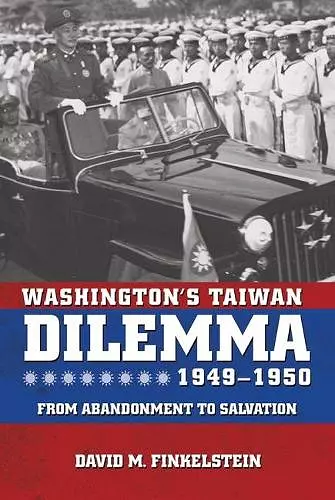Washington's Taiwan Dilemma, 1949-1950
From Abandonment to Salvation
Format:Paperback
Publisher:Naval Institute Press
Published:30th Mar '14
Currently unavailable, our supplier has not provided us a restock date

The declaration of the People’s Republic of China in October 1949 presented American foreign policy officials with two dilemmas: how to deal with the communist government on the mainland and what to do about Chiang Kai-shek’s holdout Nationalist regime on Taiwan. By early 1950 these questions were pressing hard upon U.S. civilian and military planners and policy makers, for it appeared that the Red Army was preparing to invade the island. Most observers believed that nothing short of American military intervention would preclude a communist victory on Taiwan. How U.S. officials grappled with the question of what to do about Taiwan is at the heart of this study.
Prior to the publication of this book, much of the historical literature on this critical period in U.S. policy toward China concentrated on the question of relations with the new regime in Beijing. A focus on those debates has largely overshadowed the concomitant policy debates that centred around the question of how to deal with the Nationalist regime on Taiwan. As this study shows, the two issues were inextricably linked and developing a Taiwan policy was no less difficult or controversial. Heavily informed by an analysis of declassified U.S. government documents and other primary sources, this history strongly suggests that had North Korea not invaded the south in June 1950 the U.S. would not have intervened to save Chiang Kai-shek and Taiwan from near-certain invasion.
Beyond the narrative itself, this volume is also a case study into the complex and sometimes messy processes by which foreign policy is made. It explores the tensions that existed within the Truman administration between the State Department and various newly-created entities such as the Department of Defense, the Joint Chiefs of Staff, and the National Security Council. Indeed, the history of policymaking for China and Taiwan in 1949-50 is also a case study in the early development of the post-war interagency system. It also underscores the tensions between the Executive and Legislative branches in the development of foreign policy.
The study also brings to light little-discussed and often uncomfortable issues in Taiwan history, some of which still have relevance to politics on the island even today. These include the legacies of the Japanese colonial experience,...
David Finkelstein blazes a new trail with his book. . . . Finkelstein's book will take an important place in the literature of U.S.-Chinese relations in the mid-twentieth century. . . . It is a well-documented study." --Presidential Studies Quarterly
ISBN: 9781591142522
Dimensions: unknown
Weight: 249g
392 pages